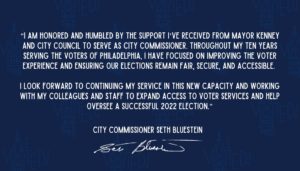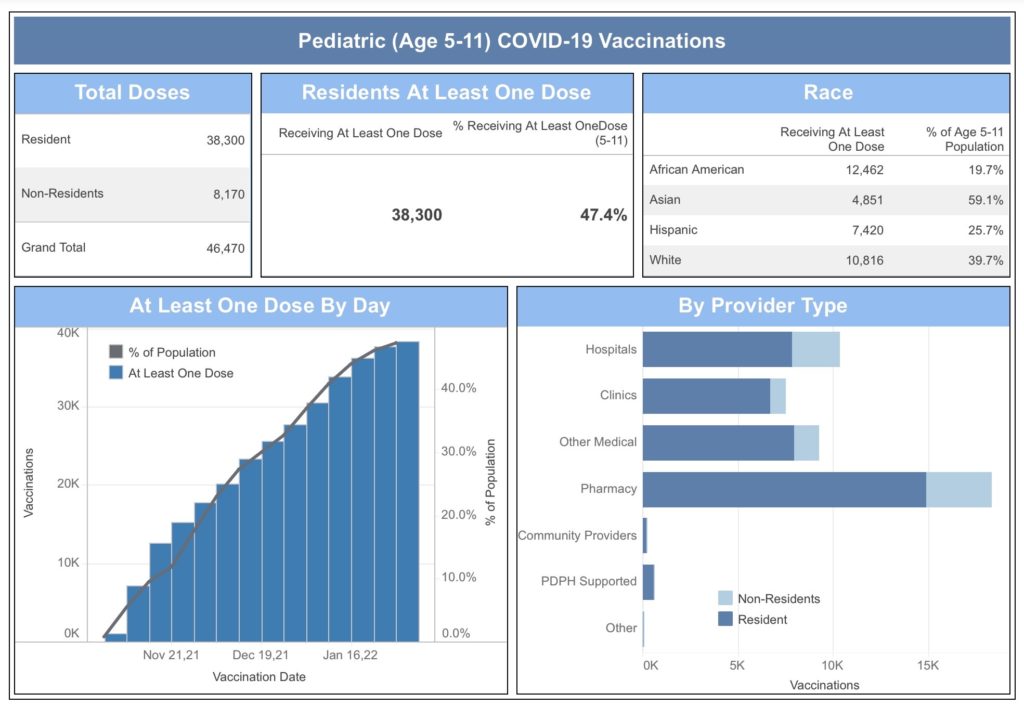CITY COUNCIL GIVES PRELIMINARY APPROVAL TO REDISTRICTING PLAN
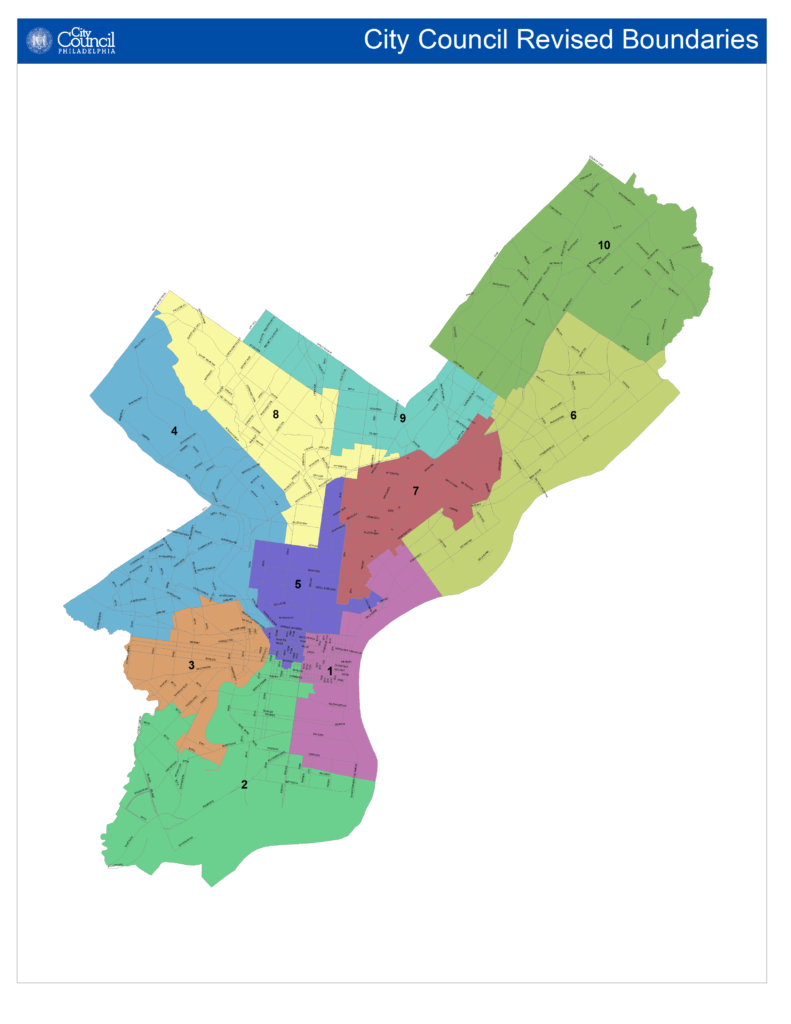 City Council this week gave its preliminary approval to legislation that revises the boundaries of its 10 districts, adhering to the requirement that Council go through once-a-decade redistricting following the results of the U.S. Census.
City Council this week gave its preliminary approval to legislation that revises the boundaries of its 10 districts, adhering to the requirement that Council go through once-a-decade redistricting following the results of the U.S. Census.
The redistricting legislation, Bill No. 220003 as amended, received unanimous approval on first reading in Council, following two hearings on the redistricting issue in which over 30 members of the public testified. The redistricting bill is now scheduled for second reading and final passage on Feb. 10th, just days before the legal deadline for Council to approve the plan.
The main changes to the districts involved dealing with population growth on the eastern half of the city, compared to some comparative population declines on the western side of Philadelphia. Eventually, boundaries were drawn so that the smallest district (4th District) will have a population size within 10 percent of the largest district (6th District), the legal requirement. Most of the new districts will average around 160,000, since the city’s population now stands at just over 1.6 million.
During the public hearings, individuals testifying raised a wide range of issues, from wanting to see more public process and engagement around redistricting, to wanting to ensure neighborhoods were not split among different Council districts. Another issue that arose involved “prison gerrymandering,” meaning how inmates were counted for purposes of redistricting. Yet another issue: Whether the city’s current map of wards and divisions is outdated and needs revisions.
Council President Darrell L. Clarke (5th District), who had the redistricting plan drafted with input from Councilmembers and staff, addressed each of the issues during the hearings. To the request for more public involvement in the process, he told the testifiers, “We do hear you.”
Regarding prisoner gerrymandering, Clarke said that staff are in contact with vendors who have the capacity to add data involving prisoners in state correctional facilities back into appropriate Council districts, based on prisoners’ last known addresses. Clarke let his Members as well as the public know that Council has the ability and authority to revisit its boundaries to add the prisoner data by district, once it is ready, and plans to do so. Clarke said that between state facility inmates and prisoners in local jails, that number may be about 10,000 individuals.
On the issue surrounding ward and division boundaries, Clarke said it was clear that revisions were necessary, as many division lines haven’t been reviewed or revised in decades. Clarke indicated that Council and staff would interact with the City Commissioners’ office to address this issue as well.
“We take our responsibilities seriously to revise our boundaries in accordance with the U.S. Census once every 10 years, and we believe this legislation accomplishes that,” Clarke said.
COUNCIL VOTE CONFIRMS SETH BLUESTEIN AS CITY COMMISSIONER
Council voted to approve veteran commissioners’ aide Seth Bluestein to fill a vacancy created when Republican Commissioner Al Schmidt resigned to become President of the Committee of Seventy.
Some members of the Working Families Party, led by Councilmember Kendra Brooks, along with a handful of progressive Democratic legislators, had raised opposition to Bluestein’s appointment, on the grounds that he is a Republican, at a time when the national Republican Party is promoting various state laws to restrict voting rights in multiple states.
But 15 members of Council, all but one of them Democrats, rejected that argument, noting that Bluestein is widely respected by voting rights experts as nonpartisan. Bluestein, along with Schmidt, Commissioner Chair Lisa Deeley, and others, worked around the clock in November 2020 to ensure that several hundred thousand voters’ ballots were accurately counted – which led to Philadelphia putting Pennsylvania in the win column for Joe Biden, in effect winning him the Presidency.
The final vote to approve Bluestein, who was nominated to fill the seat by Mayor Kenney, was 15-1. There will be an election to fill a full term as commissioner in 2023.
COUNCILMEMBERS GILMORE RICHARDSON, GYM TAKE ACTION ON ENVIRONMENTAL JUSTICE
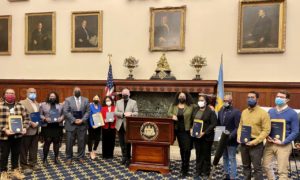 The issue of environmental justice got attention citywide this week as two initiatives were announced. First, an Environmental Justice Commission was announced by Mayor Kenney, following the advocacy of Councilmember Katherine Gilmore Richardson (At Large) and others in Council. That was followed by environmental justice legislation introduced on Thursday by Councilmember Helen Gym (At Large).
The issue of environmental justice got attention citywide this week as two initiatives were announced. First, an Environmental Justice Commission was announced by Mayor Kenney, following the advocacy of Councilmember Katherine Gilmore Richardson (At Large) and others in Council. That was followed by environmental justice legislation introduced on Thursday by Councilmember Helen Gym (At Large).
First, the mayor announced the city’s first Environmental Justice Advisory Commission, which was originally created in 2019 with the passage of legislation sponsored by then-Councilmember Blondell Reynolds Brown.
“In Philadelphia, your zip code determines your life expectancy, and environmental injustice has often been overlooked as a crucial part of community health and wellbeing,” said Councilmember Gilmore Richardson, who chairs Council’s Committee on the Environment. “With this new Commission and the creation of the Interagency Environmental Justice Working Group, we are taking another step closer to creating a whole government approach to addressing environmental injustice, and most importantly, we are centering the voices of community members who have lived experience with its impacts. Thank you to Mayor Kenney for his leadership on this issue, and to every member of the Commission for their service to the City of Philadelphia.”
The Commission appointees are John A. Armstead, Nahdir Austin, Radika Bhaskar, Paul Devine Bottone, Carlos Claussell, Mariel Diana Featherstone, Ebony Griffin, Terrill Haigler, Joyce Lee, Su Ly, Carolyn Moseley, Kermit O, Gabriella Gabriel Paez, Tyler Ray, Kinteshia Scott, Jerome Shabazz and Syreeta Thomas.
In addition to her support of the Commission, Councilmember Gilmore Richardson has worked closely with the Administration to identify additional opportunities for the City to act on Environmental Justice, including the creation of a new Interagency Working Group on Environmental Justice and the establishment of a Community Resilience and Environmental Justice Grant Fund.
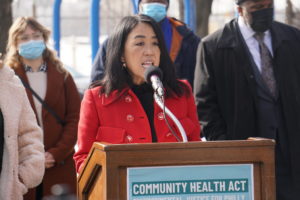 Secondly this week, Councilmember Gym announced the introduction of the Community Health Act, environmental justice legislation to better protect communities against the adverse health effects caused by pollution. The bill, written in partnership with legal and environmental advocates, establishes a clearer understanding of how new pollution actually impacts communities given existing pollution, demographics, and health characteristics. Rather than examining proposals in isolation, this process will consider the project in context and prevent concentrated areas from experiencing disproportionate harm from pollution.
Secondly this week, Councilmember Gym announced the introduction of the Community Health Act, environmental justice legislation to better protect communities against the adverse health effects caused by pollution. The bill, written in partnership with legal and environmental advocates, establishes a clearer understanding of how new pollution actually impacts communities given existing pollution, demographics, and health characteristics. Rather than examining proposals in isolation, this process will consider the project in context and prevent concentrated areas from experiencing disproportionate harm from pollution.
“Philadelphia must play a stronger role in protecting the communities most likely to be harmed by pollution: low-income communities, immigrant communities, communities of color, and young people,” said Councilmember Gym. “We are empowering the city to use their full authority to fully assess how new projects will impact our communities — ensuring new projects don’t compound harm or exacerbate the existing disparities.”
Under the legislation, the Department of Health will undertake comprehensive environmental justice mapping, taking into account environmental, climate, health, and demographic indicators. The city will identify environmental justice communities — areas within the city which bear an undue burden of pollution and adverse health impacts. New industrial projects within or adjacent to these areas which would adversely impact community health will undergo a cumulative impact analysis. This will allow the city to better understand how the new project would shape the existing community landscape, and empower the Department of Health to potentially require further mitigating steps before the project can proceed.
SEEN ON SOCIAL MEDIA…
Thank you @CNN & @sarasidnerCNN.
To every partner, constituent, academic, advocate – we did this. When people say that Philly is leading with #DrivingEquality – we did this.
Grateful to be able to share my story & looking forward to what’s next. Thanks to all who made it happen pic.twitter.com/aP6qARGW37
— Councilmember Isaiah Thomas (@CMThomasPHL) January 31, 2022
CITY NAMES FIRST PHILADELPHIA VICTIM ADVOCATE
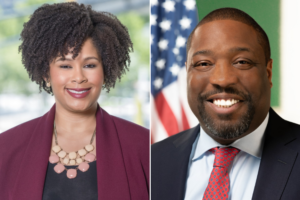 The long quest of Councilmember Kenyatta Johnson (2nd District) for the city to have a fulltime Victim Advocate has finally led to the naming this week of a local attorney, Adara L. Combs, as the first Philadelphia Victim Advocate. Mayor Kenney has transmitted his nomination of Combs for Council confirmation.
The long quest of Councilmember Kenyatta Johnson (2nd District) for the city to have a fulltime Victim Advocate has finally led to the naming this week of a local attorney, Adara L. Combs, as the first Philadelphia Victim Advocate. Mayor Kenney has transmitted his nomination of Combs for Council confirmation.
“In the aftermath of the record gun violence we’ve had in Philadelphia, this office is needed to work on system-wide issues affecting victims and co-victims in Philadelphia,” Johnson said. “The new Office of the Victim Advocate is long overdue. Advocates have told me that the fragmented nature of victim services leads to a lack of consistency and timing of outreach and services provided. I believe that we owe it to victims and co-victims to give them a voice within city government. Such an important position calls for the right person with a unique blend of skills and experience. Adara is the right person.”
The Office of the Philadelphia Victim Advocate will offer a hub for crime victims and co-victims, referring to family, neighbors, colleagues and others indirectly affected by crime. The office’s functions would include coordination, planning, and policy advocacy.
The creation of the Office of the Philadelphia Victim Advocate was a result of hearings and roundtable discussions convened by a victims and co-victims subcommittee of Council’s Special Committee on Gun Violence Prevention. Based on those proceedings, Councilmember Johnson introduced legislation to amend the Philadelphia Home Rule Charter to create a permanent, independent Office of the Victim Advocate. Voters approved the measure in November 2020.
Combs was the Supervisor of the Juvenile Division at the Philadelphia District Attorney’s office, a position she has held from 2020 until January of this year. In her role, she supervised a staff of 45 attorneys, victim coordinators, paralegals, trial listing clerks, detectives, and others. Throughout her several year career as a prosecutor she prosecuted nearly every type of criminal case. She has handled numerous cases ranging from narcotics and gun-related offenses to sexual assaults.
IN OTHER NEWS…
The long quest of Councilmember Kenyatta Johnson (2nd District) for the city to have a fulltime Victim Advocate has finally led to the naming this week of a local attorney, Adara L. Combs, as the first Philadelphia Victim Advocate. Mayor Kenney has transmitted his nomination of Combs for Council confirmation.
“In the aftermath of the record gun violence we’ve had in Philadelphia, this office is needed to work on system-wide issues affecting victims and co-victims in Philadelphia,” Johnson said. “The new Office of the Victim Advocate is long overdue. Advocates have told me that the fragmented nature of victim services leads to a lack of consistency and timing of outreach and services provided. I believe that we owe it to victims and co-victims to give them a voice within city government. Such an important position calls for the right person with a unique blend of skills and experience. Adara is the right person.”
The Office of the Philadelphia Victim Advocate will offer a hub for crime victims and co-victims, referring to family, neighbors, colleagues and others indirectly affected by crime. The office’s functions would include coordination, planning, and policy advocacy.
The creation of the Office of the Philadelphia Victim Advocate was a result of hearings and roundtable discussions convened by a victims and co-victims subcommittee of Council’s Special Committee on Gun Violence Prevention. Based on those proceedings, Councilmember Johnson introduced legislation to amend the Philadelphia Home Rule Charter to create a permanent, independent Office of the Victim Advocate. Voters approved the measure in November 2020.
Combs was the Supervisor of the Juvenile Division at the Philadelphia District Attorney’s office, a position she has held from 2020 until January of this year. In her role, she supervised a staff of 45 attorneys, victim coordinators, paralegals, trial listing clerks, detectives, and others. Throughout her several year career as a prosecutor she prosecuted nearly every type of criminal case. She has handled numerous cases ranging from narcotics and gun-related offenses to sexual assaults.
OTHER SIGHTS AND SOUNDS FROM THE COUNCIL WEEK
Committee of the Whole 2-2-2022
Stated Meeting of Philadelphia City Council 2-3-2022
PHILADELPHIA FACTS AND FIGURES
The next Stated Meeting of City Council is scheduled to take place on Thursday, February 10, 2022 at 10 a.m. The Meeting will be held remotely due to the ongoing pandemic, and will air on Xfinity Ch. 64, Fios Channel 40 and stream at www.PHLCouncil.com/watch.



